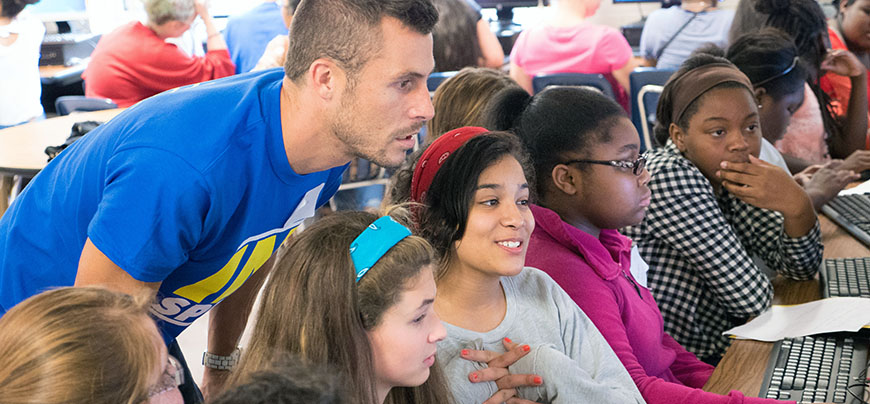
Grant-funded initiative helps fill gaps amid SC’s teacher shortage
Posted on: January 14, 2020; Updated on: January 14, 2020
By Kathryn McPhail, mcphailk@mailbox.sc.edu, 803-777-8841
More than 5,300 teachers left South Carolina public schools at the end of the 2018-19 school year. That seems like a staggering number, but it’s not an anomaly. It puts students at risk of missing out on the quality instruction they need and deserve, and the University of South Carolina’s College of Education is stepping in to help with a new initiative aimed at recruiting and retaining teachers.
As students return to the classroom this month, school districts across South Carolina are already planning how they will recruit teachers to fill the vacancies on the horizon for next fall.
Orangeburg County is one of those districts.
I think this is a truly innovative program that shows the university cares about the state. They are listening to our needs and taking responsibility for helping us improve education in South Carolina.
Jesse Washington, Orangeburg County School District
“January kicks teacher recruitment into high gear for us,” says Orangeburg County School District chief of staff Jesse Washington III.
Washington, who earned two education degrees from South Carolina, says the rural school district must fill about 60 to 70 teacher vacancies each year.
“It’s not easy to find people who want to work in the state’s rural communities,” Washington says. “As a district, we must get creative in our recruitment efforts. We go to recruitment fairs across the state. We offer student loan forgiveness and sign contracts on the spot.”
But it’s not enough. The district looks far beyond state lines for qualified teachers.
“We rely on overseas educators who come to America for three years to teach in Orangeburg County. Currently, we have about 90 foreign teachers, which is about 7 percent of our teacher base,” Washington says.
A new partnership with the university’s College of Education could change all that, helping the district recruit teachers from South Carolina who want to work and live long-term in their community.
Thanks to a $5-million Teacher Quality Partnership Grant from the U.S. Department
of Education, a new initiative in the College of Education, called Transition to Teaching,
will help recruit and retain educators in the state’s rural communities. Education
professors George Roy, Melissa Baker, Rachelle Curcio and Stephen Thompson are leading
the effort.
“The grant allows the college to collaborate with rural partner districts to recruit
more professionals into elementary and middle level master’s programs while simultaneously
gaining teaching experience in classrooms in rural communities in S.C.,” Roy says.
“We believe this will help tackle the state’s growing teacher shortage by encouraging
more people to consider teaching.”
Transition to Teaching is geared toward current teacher assistants and professionals who have a bachelor’s degree in an area other than teaching and are considering a career change.
“This is an alternative to other teacher certification pathways and will provide high-quality teacher preparation beginning during a year-long residency experience,” Roy says.
During the one-year residency, Transition to Teaching participants, or fellows as they are called, will be placed in classrooms in one of two initial partner districts — Orangeburg County and Colleton County — where they will work and learn full time alongside veteran educators and university faculty.
“They will participate in embedded course experiences with guided support and coaching from College of Education faculty,” Roy says. “They will truly be learning through hands-on teaching experiences with real students, in real classrooms in rural communities. They will be prepared to lead their own classrooms when they graduate.”
Fellows will earn a $15,000 per year stipend to help with housing, transportation and other expenses. Washington believes the stipend, coupled with loan forgiveness programs that are already in place, will help Orangeburg recruit more educators.
“I think this is a truly innovative program that shows the university cares about the state. They are listening to our needs and taking responsibility for helping us improve education in South Carolina,” Washington says.
Transition to Teaching will help provide stability for the schools and for the children because fellows are required to teach in their partner-district for at least three years after finishing their master’s degree, but Washington hopes the new teachers will enjoy their experiences and remain in Orangeburg for much longer.
“Our district really tries to support our teachers and our students, and we hope these fellows will see that and stay in our community,” Washington says.
As part of the initiative, fellows will participate in a three-year teacher induction program where they continue to receive professional development after graduation. The college's Carolina Teacher Induction Program, or CarolinaTIP, is a teacher retention program that provides recent education alumni with three years of support through group workshops and one-on-one mentoring from experienced coaches.
“The ongoing support through CarolinaTIP will be invaluable for the fellows as they begin their new careers as teachers,” Washington says. “These experiences will, no doubt, create a well-rounded teacher. I can’t wait to see this program do well in our district and beyond.”
Though the university is initially partnering with just Orangeburg and Colleton counties to implement Transition to Teaching, the professors hope to expand to other communities in the future.
“We want to create a model of teacher preparation that rural districts across the state can implement with ease and success,” Roy says. “This grant will allow the university to better prepare the next generation of great teachers.”
The College of Education will begin enrolling for the Transition to Teaching master’s degree program during the spring 2020 semester, with coursework beginning with a two-week summer institute followed by the school residency in fall 2020.
Share this Story! Let friends in your social network know what you are reading about